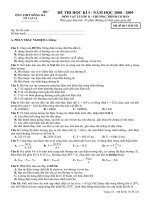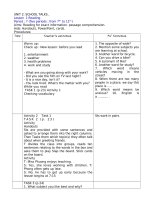Unit 2 chương trình cơ bản
Bạn đang xem bản rút gọn của tài liệu. Xem và tải ngay bản đầy đủ của tài liệu tại đây (72.83 KB, 9 trang )
UNIT 2: SCHOOL TALKS ,
Lesson 1 Reading
Period : 7 (five periods : from 7
th
to 11
th
)
Aims: Reading for exact information. passage comprehension.
Aids: Handouts, PowerPoint, cards.
Procedures:
Time Teacher’s activities Ps’ Activities
Warm up:
Check up : New lesson: before you read
1. entertainment
2. weather
3. health problems
4. work and study
- What are you going along with your work?
- Did you see the film on TV last night?
- It is a nice day, isn't it?
- You look tired. What's the matter with you?
While you read
TASK 1 (p.23) Activity 1
Checking vocabulary
1. The opposite of wide?
2. Mention some subjects you
are learning at school.
3. Another word for bicycle.
4. Can you drive a bike?
5. A synonym of like?
6. Another word for study?
7. Which word means
vehicles moving in the
street?
8. When there are too many
people in a place, we say this
place is ..... .
9. Which word means be
anxious? 10. English is
a ........... .
Activity 2 Task 1
T A S K 2 ( p . 2 3 )
Activity
Handouts
Sts are provided with some sentences and
asked to arrange them into the right columns.
Then Tasks them which topic(s) they often talk
about when greeting friends.
T divides the class into groups, reads ten
sentences relating to the words in the box and
asks them to play Slap the board. Stick cards
on the board.
Activity
T: Miss Phuong enjoys teaching.
S: Yes, she loves working with children. T:
Phong often gets up late.
S: No, he has to get up early because the
lesson begins at 7:15
Sts work in pairs.
TASK 3 (p.24)
1. What subject you like best and why?
2 What you like or dislike doing at school?
3. What you worry at school?
Homework
Write a short paragraph about your school
life.
Sts have to read the small talks again before
doing
Task 2. When they have finished, Treads the
sentences on p. 23, changing some details.
Sts agree or disagree.
Sts ask and answer the
questions. Pair work. T check
whether their answers are
right.
T helps sts to talk about
these problems by providing
them words or phrases they
need eg: useful,
important, ... for q.1. ; do
exercises, do a test,.... for
q.2; lack of teaching
equipment,.... for q. 3.
UNIT 2 SCHOOL TALKS
Lesson 2: Speaking
Period : 8 (five periods : from 7
th
to 11
th
)
A i m s and requirements: To make questions and give responses in small talks Skill:
Four skills, especially
Lesson 2 : Speaking Skill .
Teaching aids : cards, posters. Procedure:
Time Teacher’s activities Ps’ Activities
1. Check-up :Talk about the subject you
like best at school.
2. Presentation: Warm-up: chat, e-mail,
hello, goodbye
What word do you use to start a
conservation ?
-Hello. Controlled Practice:
Task 1 Place the expressions in tile
correct columns. .
Starting a conversation._ Closing r a
conversation
Good morning./ Hi.
+ Goodbye. See you later.
+...............................................
+...............................................
+.......................,.......................
+...............................'.............
+...............................................
+...............................................
+...............................................
+,..............................................
Task 2 Rearrange the sentences to
make an appropriate conversation.
2 st. from 2 groups face the class.
Sts. from each group give
description for st from their group
to find the words.
Group work -Group work: Each
group choose the cardboard with
the correct answer and put it on
the
-
blackboard. (4 groups)
-Teacher giving feedback.
-Practising speaking in ' pairs
Pair work.
Sharing the results with other
pairs.
T. giving feedback. Practising
speaking in pairs
Slap the board. Choosing the
cards with the correct word or
phrase to put on the conversation
available on the blackboard.
-Group work
-Each group is given a dice and 6
cards with the topic on. The cards
are up side down. One is
A. Bye. See you later. B. , What did you
do?
C. Where are you going now?
u . . . . . . . . . . . . . . . . . . . . . . . . . . . . . . . . . . . . . . . .
. . . . . . . . . .
Task 3 Complete the conversation
with words, phrases in the box..
what's the matter with you awful/ tired/
sick/ cold
a headache/` a cold/ backache/ toothache
You should/ You'd better o home and have
a rest
A. Hello, Hoa. You don't look very
happy. ............................?
B. Hi, Nam. I feel ......................... . I've got
............................
A. Oh, I'm
sorry ..........................................................
......
B. Yes. That's a great idea. Goodbye, Nam.
A. See you later.
Less controlled practice
Task 4 Make small talks on the 6
topics: -weather
-last night's TV film '
Activities
Two sts.
Game: Hot seat
chosen
2'
-last night's TV music -football
-plans for the weekend
-plans for the summer vacation..
3. Homework: Make a
conversation about the weather in
your neighbourhood.
to drop the dice. According to the
number of the dice, one card is
turned over and the topic is
revealed. Other members ask the
chosen one questions about the
topic.
------------------------------------------------------------------------------------------------------------
UNIT 2 SCHOOL TALK
Lesson 3: Listening
Period : 9 (five periods : from 7
th
to 11
th
)
Time: 45 minutes
Objectives
1. Students listen to conversations and number the provided pictures.
2. Students listen and complete a conversation.
•. Method:
Integrated, mainly communicative
• Teaching aids
Textbooks, handouts, PowerPoint, laptop.
• Procedure
Time Teacher’s activities Ps’ Activities
5' Warm-up (5mn)
1. The study of the events of the past.
2. Stories, poems, and plays,' especially
those that are considered to have value
-Asks students to do a puzzle.
as art .
3. The scientific study of living things
4. Work to earn money
5. The study of the Earth's physical
features and the people, plants, and
animals that live in different regions of
the world:
6. The science that deals with heat,
light, and other forms of energy and
how they affect objects
7.The study or use of computers and
electronic systems for storing and using
information. Information technology is
often simply called IT.
8. The study or use of numbers and
shapes to calculate, represent, or
describe things.
Pre- Listening (3mn)
Task 1: Listen to 4 conversations and
match them with the pictures.
Activity 1:
- Questions:
* What can you see in the picture? *
Where are they?
* What are they doing?
Can you guess what they are talking
about?
Answers:
1.C 2.E 3.A 4.B 5.D
- Asks sts to match the questions
with their appropriate answers.
- Observes and helps sts if
necessary. While - Listening
(22mn)
- Ask sts to look at the pictures ,
ask and answer about each
picture.
Students' Activities
Class work
Students can choose whatever
number while doing the puzzle. If a
student can find out the key word
he I she gets a prize.
- individual work
- compare their work with other st
- pair work
- listen and do the task.
- pair work
-----------------------------------------------------------------------------------------------------------------
UNIT 2 SCHOOL TALKS
Lesson 4: Writing
Period : 10 (five periods : from 7
th
to 11
th
)
Aims and requirements: Forms and How to Fill in forms Skill : Four skills, especially
Writing Skill Teaching aids : Computer, projector, PowerPoint, cardboards.
Procedure:
Time Teacher’s activities Ps’ Activities
3
1. Check-up
Talking about the subject you have
problems with. 2. Presentation
Look at the portrait of a person.
Ask and answer question about
him/ her based on the given
5’
5’
Warm-up: Can you tell me what your name
is? Nguyen Nam
Sue Smith, nurse, married
-When we apply for a place in a course, a
job...
- Personal information
Surname:, Nguyen, Smith First name
.
Nam,
Sue Marital status: married, single
Occupation: Nurse
Pre-writing: Task 1
Name the forms you see on the screen.
On what occasions do you have to fill a
form?
What sort of information do you often have
to provide when you fill in a form?
-What is your surname/ first name? What is
the nurse's surname/ first name? What's
the difference in the order of appearance?
-What are single/ married refer to? What
word can be used for job?
- Applying for a place in a course/ a job/
borrowing a book from the library...
- Personal and specific details
While-writing
A
B
(.First name 2.Surname 3.Date of birth
4.Country of origin 5. Present address 6.
Marital status 7. Occupation .
a. What do you do?
b. Where are you living at the moment?
c. Are you married or single?
d. What's your first name?
e. When were you born?
f. What's your surname?
g. Where were you born?
Task 2 Match a line in A with a
question in B.
Task 3: Look at the sentences in task 3,
complete the word in B so that it describes
or is a synonym of each of the words in A.
Task 2 : Listen again and answer the
information:
Asking two students to make a
small talk.
Showing some forms: Application
Form, Birth Certificate, Marriage
License, CV...
Pair work: Looking at the picture
and the information on the screen
and asking for information.
-Individually
-Group work: Each group write
the answer on a cardboard. Put it
on the board. (4 groups)
* What are they doing?
* Can you guess what they are
talking about? Activity 2:
- Asks sts to listen to 4
conversations and match them
with the pictures.
- plays the recording 3 times.
- stops the recording at each
answer.
- group work
- Listen and do the task.
- open pair









